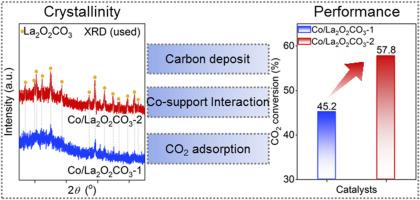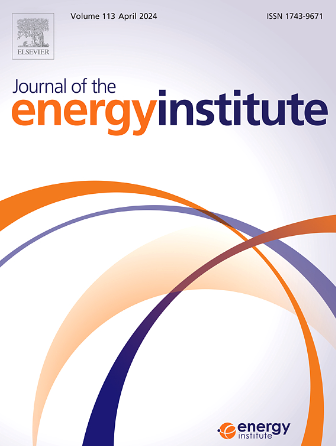Optimizing crystallinity of La2O2CO3 to boost reverse water-gas shift reaction performance over Co-based supported catalysts
IF 6.2
2区 工程技术
Q2 ENERGY & FUELS
引用次数: 0
Abstract
Reverse water-gas shift (RWGS) reaction has become an important strategy to couple application of carbon resources and hydrogen energy. However, Co-based supported catalysts in RWGS reaction consistently experience deactivation under high-temperature operation, predominantly caused by carbon deposition and metal sintering, which present major barriers to the commercial deployment. Here, crystallinity for La2O2CO3 supports were modulated to govern the metal-support interaction and CO2 adsorption performance on Co-based supported catalysts, thereby optimizing RWGS reaction performance. Despite of poorly crystallized La2O2CO3-1 fostered a stronger interaction with Co species, which detrimentally compromised CO2 adsorption capacity and inherent anti-coking functionality of La2O2CO3 themselves. In contrast, employing well-crystallized La2O2CO3-2 as the support yielded the Co/La2O2CO3-2 catalyst, exhibiting superior CO2 adsorption, exceptional resistance to carbon deposition, outstanding activity, high CO selectivity, and remarkable stability—maintaining consistent CO2 conversion and selectivity for over 100 h at 600 °C. This crystallinity-driven strategy effectively balances the Co-La2O2CO3 interaction, presenting a novel way to boost RWGS reaction performance over Co-based supported catalysts.

优化La2O2CO3结晶度,提高co基负载型催化剂的水气倒转反应性能
逆水气转换(RWGS)反应已成为碳资源与氢能耦合应用的重要策略。然而,在RWGS反应中,co基负载型催化剂在高温操作下经常失活,主要是由碳沉积和金属烧结引起的,这是商业应用的主要障碍。本文通过调节La2O2CO3载体的结晶度来控制金属-载体相互作用和co基负载催化剂对CO2的吸附性能,从而优化RWGS反应性能。尽管La2O2CO3-1结晶较差,但其与Co的相互作用较强,不利于La2O2CO3本身的CO2吸附能力和抗结焦功能。相比之下,采用结晶良好的La2O2CO3-2作为载体制备的Co/La2O2CO3-2催化剂具有优异的CO2吸附性能、优异的抗碳沉积性能、优异的活性、高Co选择性和卓越的稳定性——在600℃下保持100小时以上的CO2转化和选择性。这种结晶驱动策略有效地平衡了Co-La2O2CO3相互作用,为提高co基负载催化剂上RWGS反应性能提供了一种新方法。
本文章由计算机程序翻译,如有差异,请以英文原文为准。
求助全文
约1分钟内获得全文
求助全文
来源期刊

Journal of The Energy Institute
工程技术-能源与燃料
CiteScore
10.60
自引率
5.30%
发文量
166
审稿时长
16 days
期刊介绍:
The Journal of the Energy Institute provides peer reviewed coverage of original high quality research on energy, engineering and technology.The coverage is broad and the main areas of interest include:
Combustion engineering and associated technologies; process heating; power generation; engines and propulsion; emissions and environmental pollution control; clean coal technologies; carbon abatement technologies
Emissions and environmental pollution control; safety and hazards;
Clean coal technologies; carbon abatement technologies, including carbon capture and storage, CCS;
Petroleum engineering and fuel quality, including storage and transport
Alternative energy sources; biomass utilisation and biomass conversion technologies; energy from waste, incineration and recycling
Energy conversion, energy recovery and energy efficiency; space heating, fuel cells, heat pumps and cooling systems
Energy storage
The journal''s coverage reflects changes in energy technology that result from the transition to more efficient energy production and end use together with reduced carbon emission.
 求助内容:
求助内容: 应助结果提醒方式:
应助结果提醒方式:


